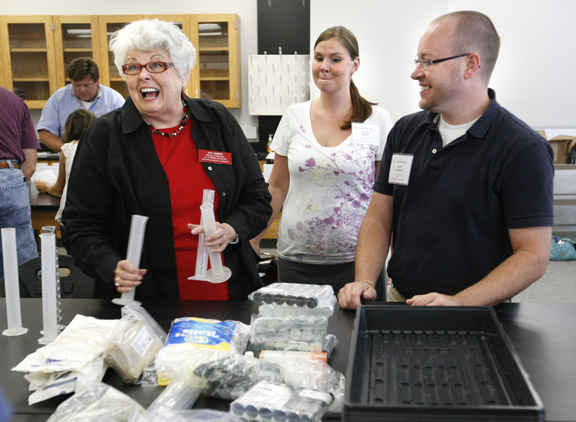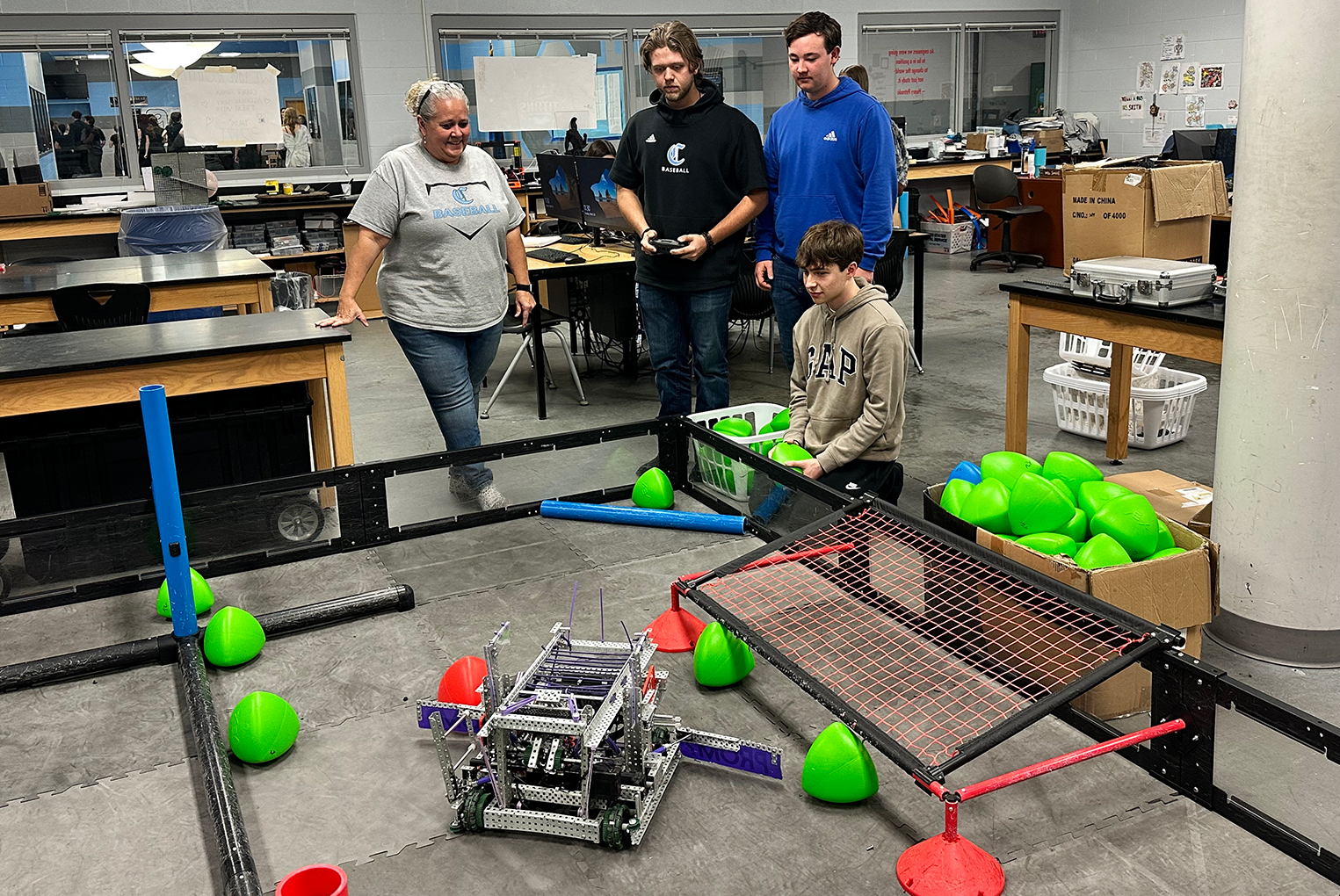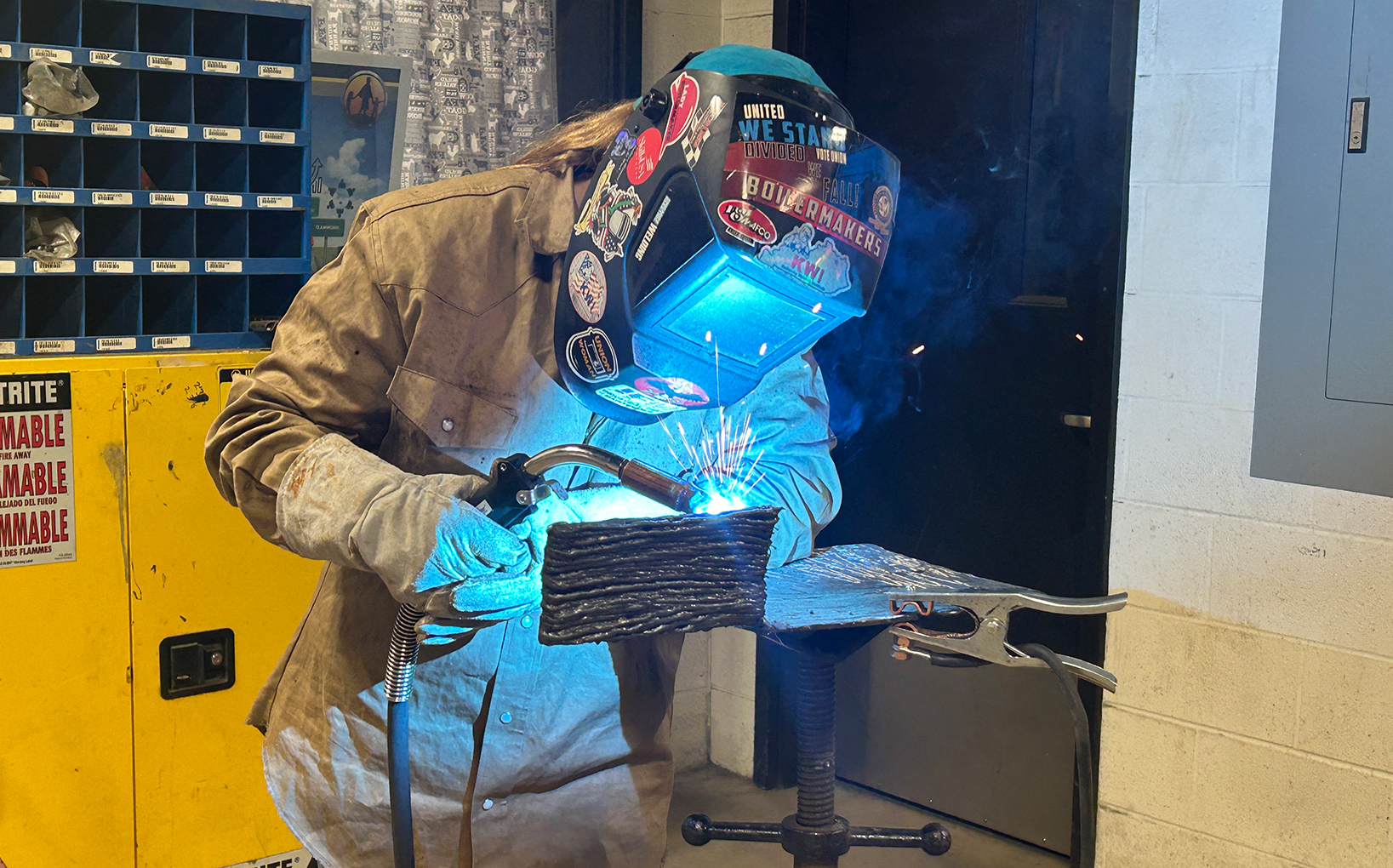
Biology consultant Ann Griffin, left, works with Holmes High School (Covington Independent) teacher Elaine Eifert and Warren Central High School (Warren County) teacher Joey Norman on an experiment during the 2010 Advanced Placement (AP) Summer Institute at Western Kentucky University June 28, 2010. The institute provides AP teachers the opportunity to share experiences and brainstorm ways to improve teaching strategies and methods. Photo by Amy Wallot
AP summer institutes advance teacher, student learning
By Susan Riddell
Some teachers come to network. Some want to know about testing changes. Others pick up new strategies for classroom learning, while others want a challenge for themselves.
But the common bond they all share is they want to be better Advanced Placement (AP) teachers.
And there’s no better place for AP teachers to come together than an AP Summer Institute, a week-long program led by experienced AP consultants who offer more than 20 different workshops, according to Julia Roberts, founding director of the institute at Western Kentucky University.
“The fact that we have offered the Advanced Placement Institute for 27 summers will tell you how important I think this professional development opportunity is,” Roberts said.
AP Summer Institutes also were held at Morehead State University and the University of Louisville this past summer.
More than 475 AP teachers attended the 2010 institute held this past summer at Western. Teachers came from three countries, 17 states and 91 Kentucky school districts to work with consultants – some of whom are text authors for AP exams.
“Participants in the institute learn so much from the consultants and also establish a network of teachers who teach the same Advanced Placement course,” Roberts said.
Kim Adams, a science teacher and department chair at Trigg County High School, said collaboration between teachers across the state and beyond is hard to come by on a daily basis.
“This year’s institute was productive because all of us had been teaching AP biology for at least a couple of years,” Adams said of her group within the institute. “We were able to share experiences and materials and to brainstorm ways to improve our current teaching strategies and methods.”
This was Adams’ fourth trip to the summer institute. In her three previous visits, Adams attended the beginning teacher courses, but she came in as an experienced teacher this past summer.
“Because of the information and materials I receive at the institute, I am able to improve my course for the next school year,” Adams said
“New labs and activities, web resources, and teaching strategies for specific topics help me make the AP biology content more accessible to the students in my class.”
David Buchele teaches biology, chemistry, physics, anatomy and physiology, and earth/space science at Frederick Fraize High School (Cloverport Independent). He attended the summer institute for the second time in 2010. Buchele has been teaching for 26 years in the Cloverport school district. This is only his second year, however, as a high school AP teacher.
He appreciates the “basic strategies for implementing and conducting the AP biology course – especially tips for conducting the labs,” Buchele said. “The institute keeps teachers aware and prepared for the rigor involved in these sorts of courses. The biggest benefit is to hear and see tips from experienced teachers who have been teaching AP for a while. I am a new AP teacher, so all the training will be beneficial in implementing our courses at school.”
AP consultants come from all over the United States to instruct the teachers at the institute. Each brings his or her own spin to the workshops.
While one biology consultant is speaking to a class about changes in the AP exam in the next few years, another biology consultant may be working with teachers on how to make the most of classroom time.
That’s what Ann Griffin, a biology consultant at the Western AP Summer Institute, did when her beginning biology teachers participated in a group lesson on how to set up experiments.
Griffin said her session shows teachers the importance of being prepared for lab lessons. Teachers in the class formed groups and followed a set of directions that led them to creating a safe environment for experimentation.
“Teachers can take tests and papers home and grade them to free up classroom time, but they can’t take labs home and set them up there to free up time,” Griffin said. “That has to be done in the classroom. But teachers still need the practice. If they aren’t sure how to set up the lab, then it will take more time away from the lesson when students are ready to learn.”
“Teachers need the experience of knowing how much time it takes,” Griffin added. “Some labs take a lot of time to set up. Teachers don’t need the extra stress of that uncertainty, either.”
Griffin said her session is just one of many that go hand in hand both in subject matter and across curriculums with the goal of enhancing a student’s learning experience.
“The AP exam scores will come when the teachers are able to get the most out of their time in the classroom with the students,” she said. “In here, we’re focusing on the AP program as a whole, not just the actual testing. That’s only a small piece of this.”
Buchele said it’s important for teachers to push themselves so that the end result can be met, and that’s getting students ready to excel in college and beyond.
“AP classes offer an opportunity for high achievers to excel and to be challenged beyond what may be available in regular course work,” Buchele said. “Also, in today’s marketplace those who are successful in AP course work should have a ‘leg up’ in getting into certain schools as well as jobs.”
MORE INFO …
www.wku.edu/gifted
Julia Roberts, julia.roberts@wku.edu, (270) 745-6323



Leave A Comment